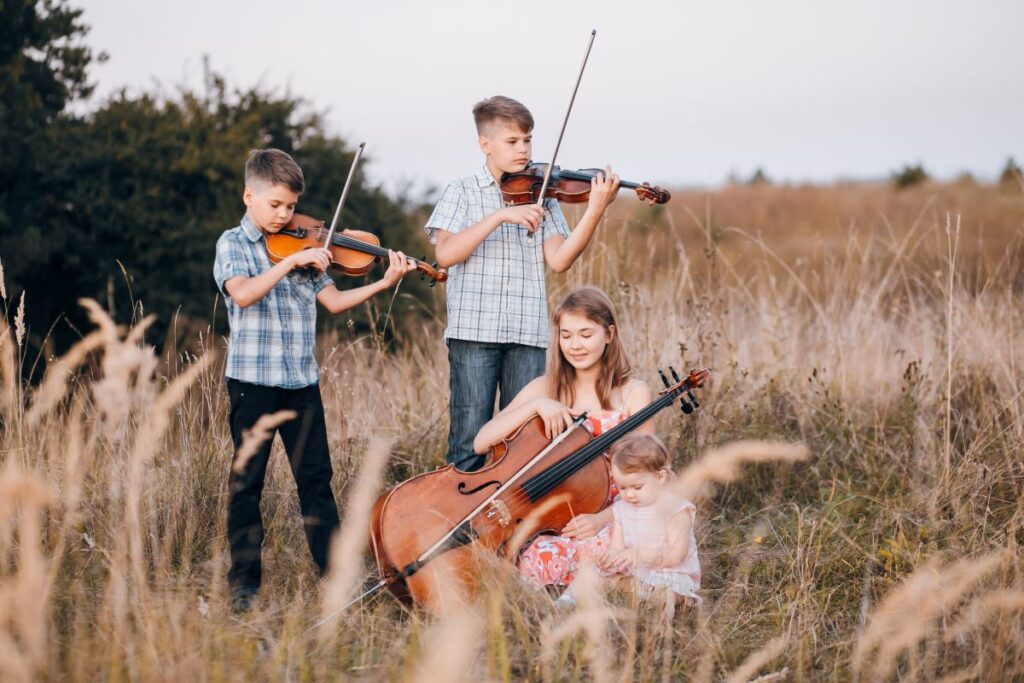
Learning an instrument—whether it’s the violin, viola, piano, or another—can have a lasting impact on children, supporting their development in unexpected ways.
As parents, we always look for ways to keep our kids engaged in activities that help them grow, develop, and express themselves. While we juggle sports, school, and family life, we might notice an untapped musical talent or interest in our children that’s worth nurturing.
Here’s a look at some of the powerful benefits that come with learning an instrument at a young age.
1. Boosting Brain Power
Learning an instrument is more than just mastering notes, it’s a way to exercise the brain. When kids play music, they’re working with rhythm, timing, and finger coordination, engaging both the logical and creative sides of their minds. Research shows that musically trained children often perform better on memory and cognitive tasks. Skills like focus, attention, and problem-solving improve as they practice and learn new pieces.
This brain boost often extends into academics. Children who play instruments tend to do better in math and reading, as the mental focus required in music strengthens their ability to tackle complex tasks, organize thoughts, and stay engaged in school.
2. Developing Patience and Discipline
Learning an instrument takes time and effort. Kids don’t learn to play a song perfectly overnight. They have to work at it, revisiting tricky sections, trying new techniques, and building up their skills slowly but surely.
This experience teaches them the value of persistence and hard work. Even if they’re not aware of it, they’re learning to manage frustration, build patience, and practice discipline. These are life skills that will help them far beyond the music room, giving them the tools to take on challenges with resilience and determination.
3. Reducing Stress and Boosting Happiness
Today’s kids are often balancing school, sports, and a busy social life, and it’s easy to see how they might feel a little stressed. Music provides a healthy outlet for relaxation and emotional release. Playing an instrument or even just listening to music allows children to immerse themselves in sound, offering a break from their daily routines and responsibilities.
Studies suggest that music therapy can reduce stress, help with focus, and even support children with ADHD or anxiety. Playing music releases endorphins—the “feel-good” hormones—making it a great way for kids to unwind and find peace.
4. Boosting Confidence and Self-Expression
One of the most rewarding aspects of learning an instrument is the confidence boost that comes from mastering a new skill. For children, the sense of achievement they get from playing a song or performing for family can be incredibly empowering. It shows them that they’re capable of overcoming challenges and learning something meaningful.
Music is also a wonderful form of self-expression. Once kids reach a certain level, they can explore different styles, create their own compositions, or play music that resonates with them emotionally. Music becomes an outlet for their creativity and a way to explore their own unique voice.
5. Teaching Responsibility and Time Management
As children progress in their musical journey, they’ll realize the importance of regular practice. Maintaining a consistent practice schedule and balancing it with school and other activities teaches them valuable time-management skills.
Music by nature is structured and timed. As kids learn to keep rhythm and follow measures, they’re also learning to organize their thoughts in a timed manner. This habit of goal-setting and time management helps them in school and other aspects of life, turning practice into a productive and rewarding routine.
6. Learning to Work with Others
While music can be a solo activity, instruments like the violin, viola, and piano are often played in group settings like orchestras or bands. In these settings, children learn to listen to others, stay in sync, and contribute to a shared goal. This teaches them essential teamwork skills and builds a sense of community, as they feel like part of something larger.
Playing in an ensemble shows children the importance of their role in a group. They develop empathy and learn the beauty of collaboration, understanding that every part contributes to the whole.
Ready to Get Started?
Introducing your child to music can be one of the most rewarding gifts you can give. Not only will they learn to play beautiful melodies, but they’ll also develop focus, patience, confidence, and a sense of achievement that can last a lifetime.
At Henrico Music, we are dedicated to providing personalized violin, viola, and piano lessons that inspire students of all ages and skill levels. Together, we’ll build a joyful, sustainable foundation in music tailored to each individual’s journey.
Encourage your child to explore music—it may just become the highlight of their week and open doors to a world of growth and discovery.